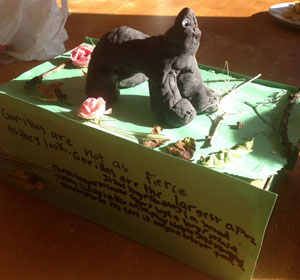Julie Samrick
Kid Focused

Can you tell what this is? It's a clay gorilla, created in its entirety by my 7-year-old daughter. The school assignment was to create a rain forest animal at home and to search for facts about it for their first little research report. It was a great idea. I loved watching her learn how to take simple notes for the first time and then learn to distill that information down to answer the report questions. She even got to include her own fun facts that she found interesting, and it was great to see what she'd choose. Did you know gorillas always walk on their knuckles, and that they only eat meat when they're in zoos? Left to their own devices, gorillas are vegetarians.
Yet, when my daughter came home from giving her report and sharing her clay gorilla, she said matter-of-factly, "Some people had a lot fancier animals. Mine didn't look so good next to theirs."
I flashed back to two years before when my now third-grade son did the same, cute rain forest report on vampire bats. At open house, all of the clay figures were on display. My son's looked like a first grader did it. Many others looked like full-on masterpieces. Naïve to the issue at the time, I side-whispered to my husband, "Obviously art doesn't run in our family." But since then, I've realized that parents, not 6- and 7-year-olds, made those clay projects.
I just want to know: why? These are good, well-meaning parents, but it boggles me.
Now this isn't a self-esteem post about how I don't want others to showcase their accomplishments because it will hurt my daughter's feelings. No, kids need to learn to be resilient and realize that there are many other smart, artistic, athletic, (you fill in the positive word) people in the world. It's good for them to handle situations where they may feel inadequate or even envious without turning their anger or anxiety inward (or outward, which would look like bullying).
What it really comes down to is that we need to let our kids do their own work, which will in turn allow them to make their own decisions and experience their own ups and downs. This might start in the first grade by stepping back and letting them solve social issues on their own, or by letting them do their own homework and projects with our help only when asked. I hear more and more stories of parents going to job interviews with their grown children or even calling the manager after the interview to ask why their child didn't get the job. There are many years between both scenarios, but the leap from one to the next isn't so huge.
Instead of coddling kids, give them independence. It is true that the more autonomy we give them within reason (being neglectful would be the opposite extreme of helicopter parenting), the more opportunities they have to earn pride. Because, you see, when kids are allowed to do something on their own (fill in the blank of what age-appropriate thing that might be), they will feel pride, and pride is, in turn, the pillar of self-esteem.
Julie Samrick is a stay-at-home mom of four young kids and the founder of Kid Focused, a site devoted to children and family issues. Subscribe to the free Kid Focused newsletter delivered weekly to your inbox and connect with us on Facebook too. Permission granted for use on DrLaura.com.